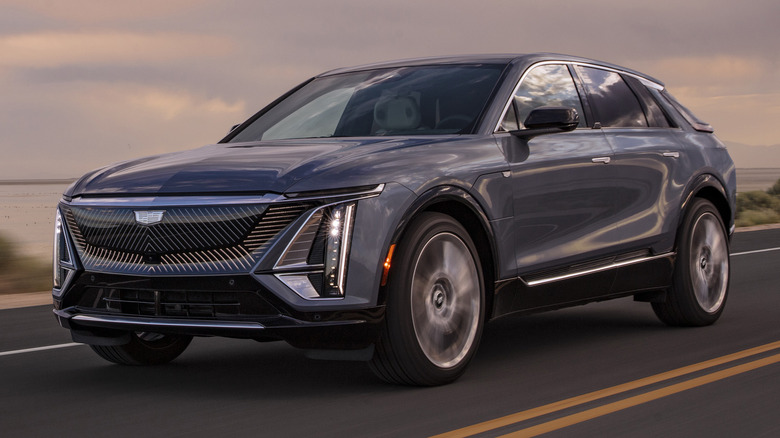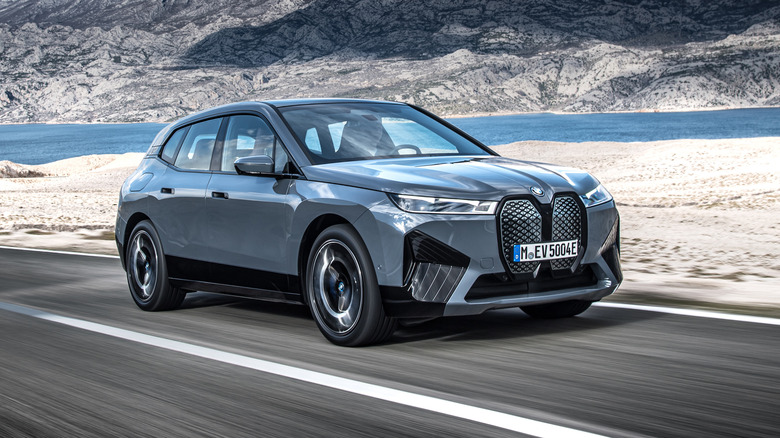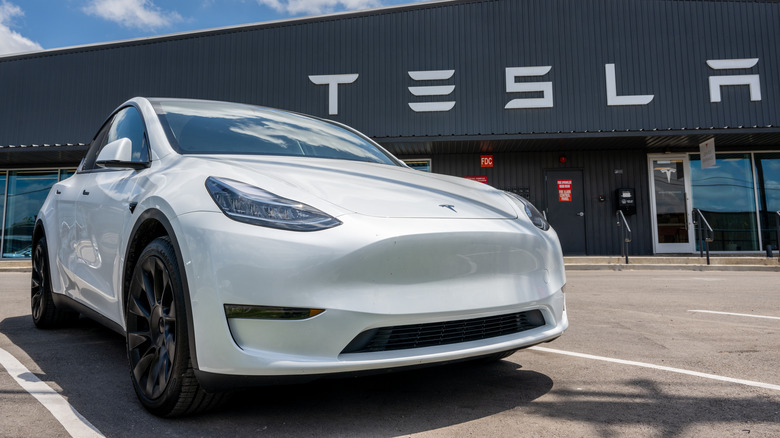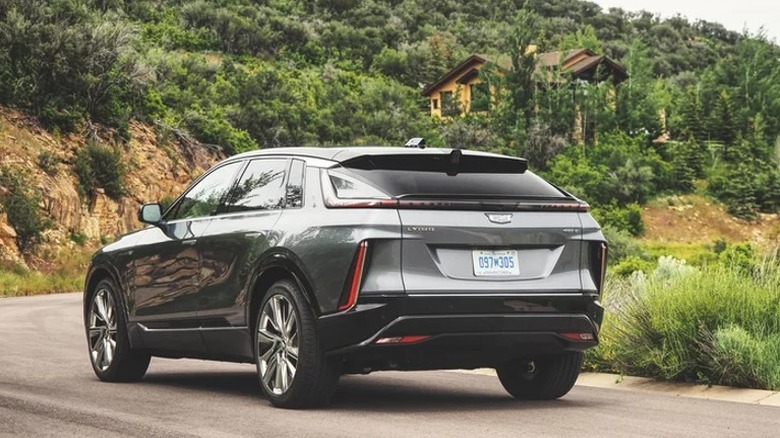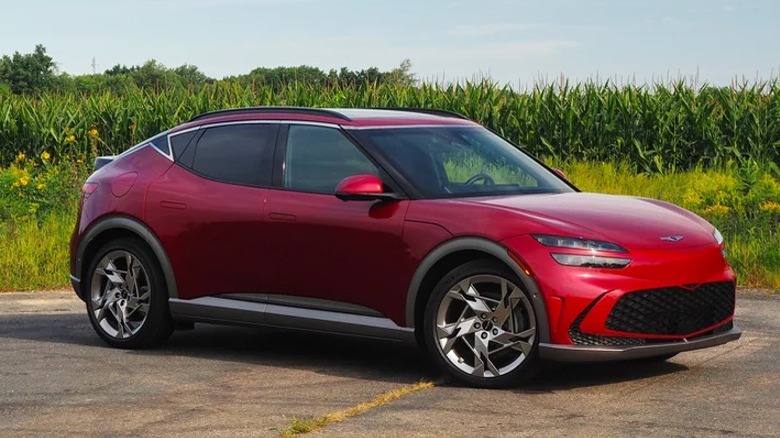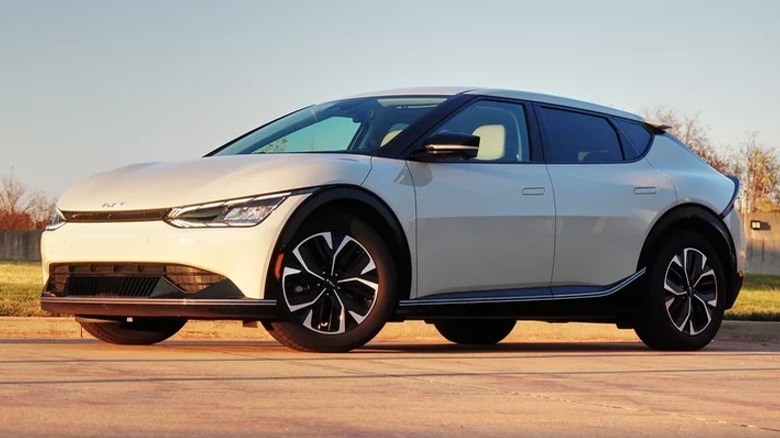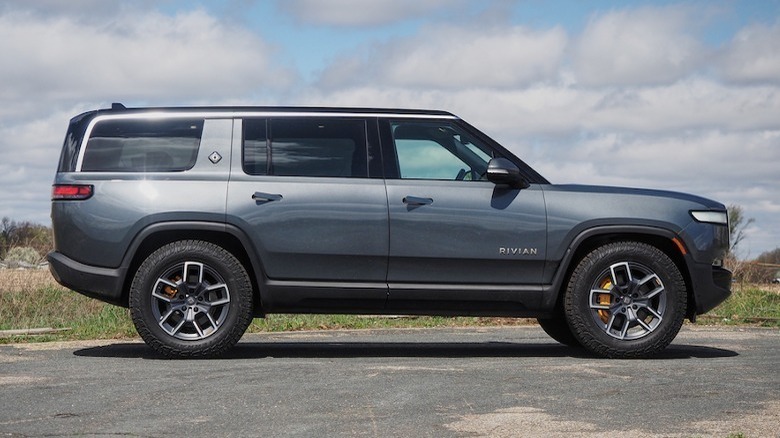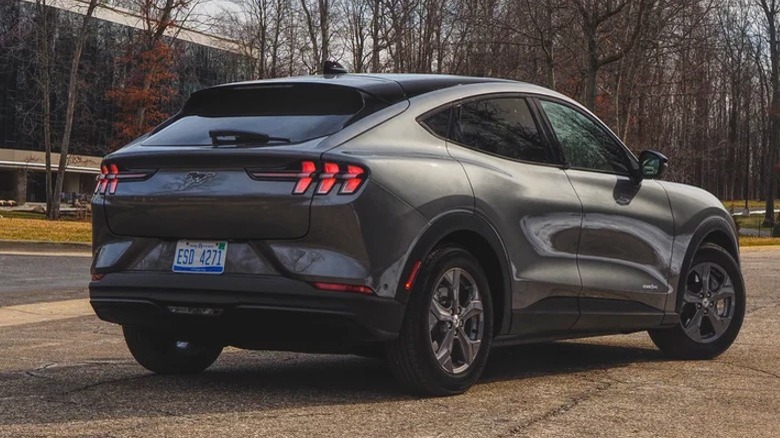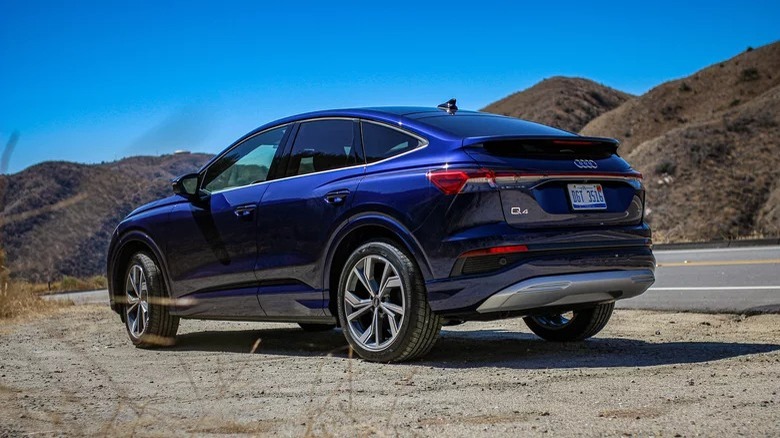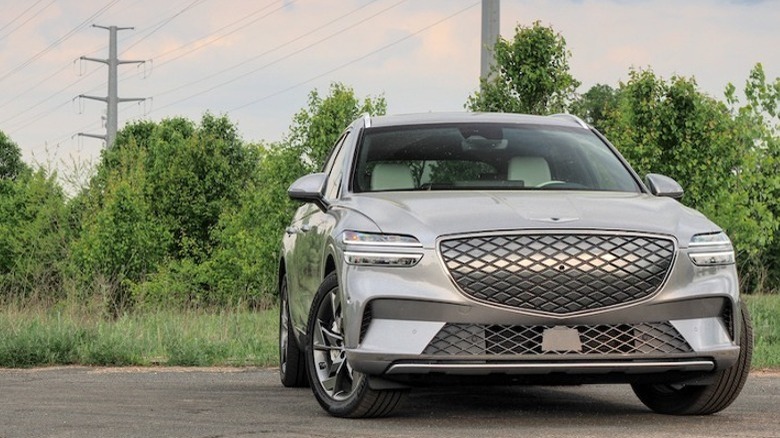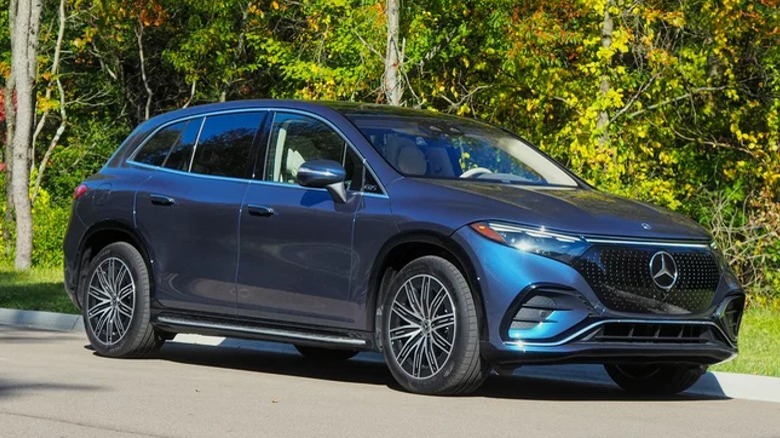Best Electric SUVs Of 2023
It wasn't too long ago that the conversation surrounding the best electric SUVs always came back to something with a Tesla badge, but times are changing. Other manufacturers have caught up to Tesla's Model X and Model Y, offering superior luxury, better handling, higher levels of build quality, or a more attractive price. Often, it's a mix of all of those factors. That's not to say that Tesla isn't still competitive -– the sales figures of the Model Y prove the opposite –- but it's no longer quite as cut-and-dry when it comes to choosing an electric SUV.
The 2023 model year has now come and gone in some cases, and certain SUV models have proved so popular that they've already sold out. To buy one, you'll have to get on the waiting list for 2024. Still, to provide a fair comparison, we're only including 2023 model year cars in this list, even if 2024 models are already on sale. Narrowing the list down is no easy task, and there are plenty of good cars that just barely missed out. However, we think these 10 represent the best electric SUVs on the market for 2023.
BMW iX
Let's address the elephant in the room -– the BMW iX's styling is, to put it nicely, divisive. It features one of the more extreme interpretations of the Bavarian brand's signature front grille, paired with skinny LED lights and chunky contrast accents. It's not to everyone's taste, but if you can get past its looks, it's a thoroughly likable SUV with all the characteristics buyers expect from a BMW. In our initial test of the BMW 2022 iX, we compared its handling to that of the BMW X5, allowing the EV a slightly sportier feel but acknowledging that the gas-powered SUV has an edge when it came to steering precision.
Much like the X5, the iX's cabin is comfortable and filled with tech, although the hexagonal steering wheel in the iX is a clear reminder that you're not in any run-of-the-mill ICE SUV here. The car's range is decent even if it's not class-leading, and support for 195 kW DC fast charging should keep charging times down to a minimum. BMW claims that the iX can produce 90 miles of range in 10 minutes of charging and the battery can charge from 10% to 80% in 40 minutes.
The iX's price might put off some potential buyers -– a starting MSRP of $87,100 puts it on the steeper end of the spectrum compared to its rivals -– but if you've got deep enough pockets and don't mind its appearance, it's an excellent choice.
Tesla Model Y
The smaller of Tesla's two SUVs is arguably the better, especially if you're looking for a seven-seater. The option to add two extra seats to the base configuration of the Tesla Model Y was lowered in price from $4,000 to just $1,000 at the end of April, making this SUV an even more attractive option.
The cheapest Model Y starts at just under $48,000, and all variants pack at least 269 miles of range, with up to 330 miles available with the Long Range AWD. In addition, buyers get access to two of the key things that have given the brand's cars a competitive edge for years now – Tesla's innovative range of in-car features and access to the Supercharger network.
The Model Y has proven to be a consistent bestseller since its launch, and it's currently the best-selling EV in America. Other rivals might offer fresher design or a higher level of build quality, but it seems like Tesla got the formula just right with the Model Y, as it can barely keep up with the demand for it.
Cadillac Lyriq
Summing up the appeal of the Cadillac Lyriq is simple — it feels like a proper Cadillac, and perhaps even more so than many of the brand's recent crossovers and SUVs.
Most of the interior is bespoke rather than relying on the stock parts GM has recycled for years, which means it generally all feels well put together, even if there are a few plasticky bits of trim that don't quite feel up to par. It drives like a Cadillac, too –- the ride is soft, although put your foot down and it's no slouch. Base models get 340 horsepower, while the dual-motor option bumps that figure up to 500 horsepower. The cabin's infotainment system also benefits from a complete refresh, with Google navigation built-in. There are still buttons for the car's most basic functions, but it's the central touchscreen where most additional features can be found.
As such, the Lyriq feels like a return to form for Cadillac, but the biggest issue is that it's difficult to actually buy one. The 2023 model year had sold out by mid-2022, and buyers of the 2024 model face significant wait times between ordering and delivery.
Genesis GV60
Hyundai's luxury arm might not have gained the brand recognition of its Japanese or German competition just yet, but its cars can very much compete with the big players. The electric Genesis GV60 is the brand's first car built on the Hyundai Electric Global Modular Platform (E-GMP), meaning it was built from the ground up as an EV rather than converted from a traditional ICE platform. It gets all the essentials right, as its styling is sharp and distinctive, its interior feels as upmarket as its rivals, and its range of at least 235 miles is competitive with what else is on offer in the segment.
Alongside the basics, the GV60 adds a few fun features that make it more memorable to drive than many other electric SUVs. The best of those is the Boost button on the steering wheel, which gives you a temporary increase in horsepower for quicker overtakes or just having fun on open roads. Charging is speedy, too, with Genesis claiming a 10% to 80% charge takes just 18 minutes on a 350 kW DC fast charger. Like several other SUVs on this list, the biggest issue with the GV60 is availability. It's only available in select states and in limited numbers, which means it remains out of reach for many buyers.
Kia EV6
Built on the same platform as the Genesis GV60, the Kia EV6 offers many of the same benefits for a lower upfront cost. Kia has developed a reputation in recent years for offering cabins that feel more premium than its pricing would imply, and the EV6 is no different. There are dual 12.3-inch displays with a head-up display available on top-spec trims. It's packed with safety tech as standard too, and the Remote Smart Parking Assist can maneuver in and out of tricky parking spaces by itself.
Performance is generally solid, even if it's still a ways off what the Genesis GV60 can offer. Still, it's more than powerful enough for highway driving, and the EPA-estimated 274 miles of range on offer with Kia's long-range battery should be satisfactory for most people.
The EV6 isn't headline-grabbing, it doesn't boast any particularly unique tricks up its sleeve, and its design is less divisive than many other recently-launched EVs. Still, it's a solid all-rounder that gets all the important things right and does so for a price that's competitive with other segment leaders.
Rivian R1S
Rivian might still be the new kid on the block, but the R1T pickup and R1S SUV prove it means business. The R1S sports the same distinctive styling that debuted on the R1T, with chunkier, more upright proportions than we're used to seeing on an EV. Driving it, you notice that chunkiness, especially on the highway, where we found Rivian's Highway Assist to end up driving uncomfortably close to neighboring trucks. The beefy tires on our tester also increased road noise and wind noise was more noticeable than in other electric SUVs.
However, that's part and parcel of driving a boxy SUV with all-terrain capability, and if anything, it should endear the car to buyers who might normally find an EV a little clinical. The interior is great too, and we found none of the quality control issues that often plague cars from startup car manufacturers. It might not be a typical EV in some senses, but the R1S carves out its own distinct niche in this still-emerging market, and it's a compelling alternative to the usual crowd of luxury three-row SUVs, electric or not.
Ford Mustang Mach-E
The Ford Mustang Mach-E takes one of the most iconic nameplates in American automotive history and attaches it to an electric crossover SUV. Thankfully, it's not been pitched as a replacement to the iconic pony car -– the latest generation of the gas-powered Mustang recently opened for orders -– but it makes an intriguing addition to the Mustang family. In top-spec GT form, it certainly packs the performance to make it worthy of the name, even though our base-spec tester felt a little less punchy.
It also holds up well against its EV competition, with enough features to satisfy tech enthusiasts and handling that feels suitably sporty but without compromising on comfort. Pricing is also competitive, as the Mustang Mach-E starts at $42,995 for 2023, although the GT is significantly pricier at $59,995.
An electric SUV with a Mustang badge might never be able to win over the purists, but there's no denying that the Mach-E offers top-tier bang for the buck in its segment.
Audi Q4 e-tron
As the cheapest of Audi's electric vehicles, the 2023 Q4 e-tron provides a middle ground between the usual raft of affordable EVs and the often prohibitively high pricing of luxury electric cars. It's only a tad more expensive than rivals from Ford, Volkswagen, and Tesla, yet it feels considerably more premium than all of them. It's comfortable, there's plenty of tech as standard, and although the lack of one-pedal driving might put off long-time EV drivers, first-time switchers won't mind.
It's not as luxurious as Audi's higher-priced electric SUVs, and with 201 horsepower available in base trim, it's not as fast either. Even so, it feels brisk enough for everyday driving, and higher trims benefit from dual motors making a combined 295 horsepower. The official range sits between 236 and 265 miles depending on the trim you pick, and with a suitably powerful DC fast charger, charging from 5% to 80% takes 36 minutes.
A lot of EV makers tend to prioritize either luxury or aggressive pricing in an attempt to woo customers, but if you can afford to pay the premium, the Q4 e-tron strikes a great balance of both.
Genesis Electrified GV70
Like its smaller sibling the GV60, the Genesis Electrified GV70 is an excellent EV that's frustratingly difficult to buy in America. Dealerships in just 23 states offer the car, something that Genesis blames on ongoing supply shortages of vital EV components. If you can get your hands on one, it's well worth considering –- with 429 horsepower and 516 lb-ft of torque on tap, it'll leave some sports cars behind off the line, and its cabin is a refined, upscale affair that's on par with Genesis' gas-powered models.
In fact, the GV70 itself is available in ICE form, which is what gives the Electrified GV70 its slightly awkward name. From a distance, it's hard to tell the difference between the gas-powered GV70 and the EV version, with the biggest giveaway being the large faux grille on the electric car. Press down the right part of that grille, and you'll find a discreet cover for the charging port hidden in plain sight.
Like many of the best EVs, the appeal of the Electrified GV70 isn't really that it's electric but rather that it's a great premium SUV that happens to be electric. Perhaps the biggest downside is its range, which at 236 miles, is okay but far from class-leading. Well, that and the fact you can't buy the car at all in over half of the country.
Mercedes-Benz EQS SUV
The EQS SUV is the SUV version of the EQS, which is itself the unofficial electric version of the S-Class, the brand's flagship luxury sedan. Still following?
Either way, Mercedes has a reputation for filling its lineup with cars covering a wide range of niches, and the 2023 EQS SUV is very much a niche interest. If you can justify an EV with a price tag north of $130,000 after extras, though, it's a very appealing car. It's a particularly tech-heavy affair, with the huge MBUX Hyperscreen forming the centerpiece of the dashboard. It incorporates three separate displays into one car-spanning screen, which can be a little overwhelming if you prefer cars with minimal distractions.
The interior is exactly what you'd expect from a car that's been billed as an electric S-Class SUV -– supremely comfortable, with plush leather upholstery and heated, ventilated seats with massage functions. The 64-color ambient lighting adds a futuristic aesthetic that our own Chris Davies described as "like drifting through a sea of electroluminescent jellyfish." At the same time, the car's 10% to 80% fast charging time of 31 minutes means you'll have plenty of time to admire the uniquely colorful interior.
Ultimately, the EQS SUV is predictably pricey and the car's 285 mile range isn't the best in class. Still, if you can justify the initial outlay, the EQS SUV is one of the techiest SUVs on the market — with a healthy dose of opulence thrown in to boot.
